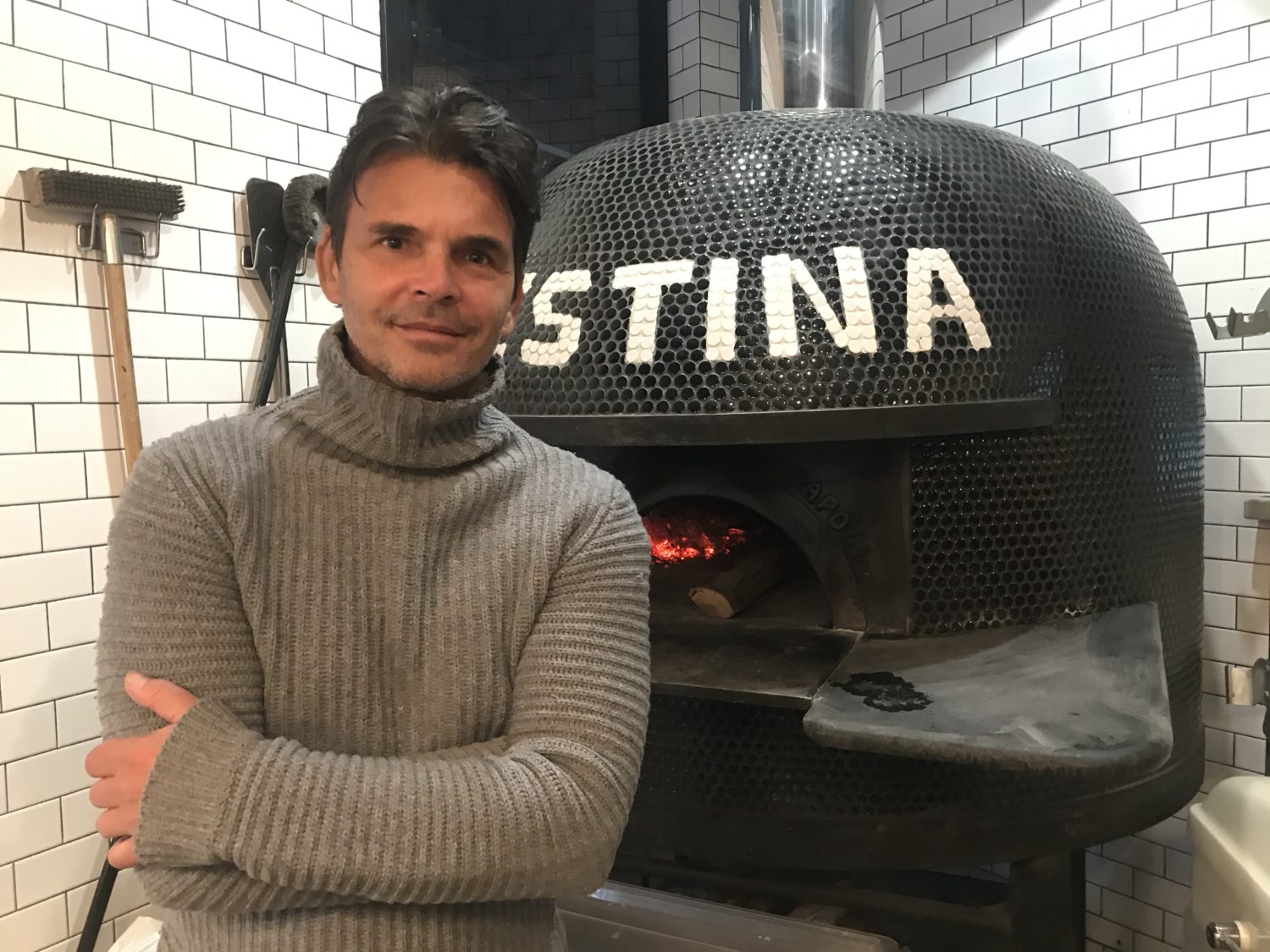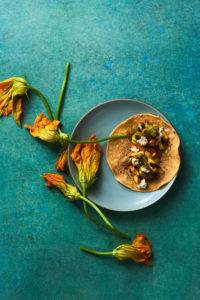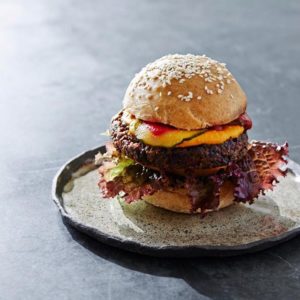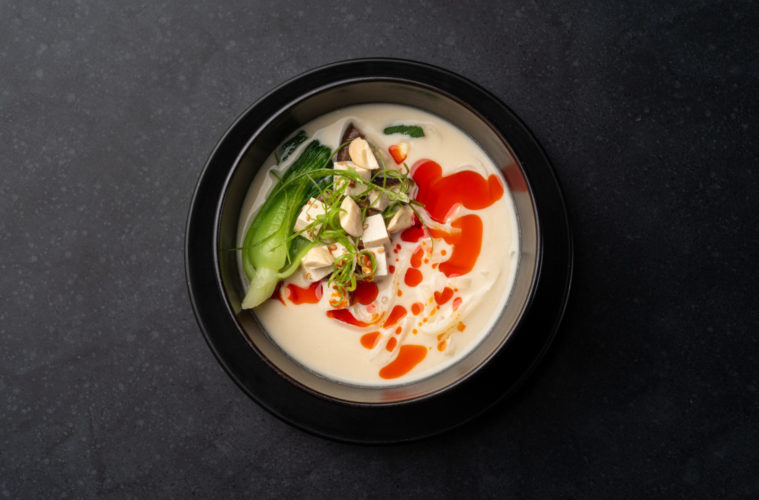Restauranteur Matthew Kenney is the poster child for a plant-based lifestyle on every level – both personally and professionally. The 56-year-old chef who has just opened the Sestina pasta bar in Culver City – his fourth vegan restaurant in Los Angeles – and who owns another 40 around the world looks more like a 25-year-old college student.
Always shifting with the tide in a yoga-based Zen-like manner, the Matthew Kenney Cuisine team is tackling the Covid takeout and delivery challenge head on by launching the Test Kitchen at Plant Food + Wine series of three new menus allowing diners to preview the menus for future restaurants, which have been under development, at home until sit-down dining options resume.
The popular Venice venue and wellness lifestyle brand will be offering guests a series of new brick and mortar concepts that have been in the works for future restaurants in a delivery/take-out model. As a lifestyle brand that caters to the wellness crowd, MKC’s mission aims to put health first, which is the goal for the new pop-up restaurants. His flagship Plant Food + Wine will be offering limited time pick-up and delivery first looks at new menu items from soon to be completed restaurants
In addition to his stable of brick and mortar plant-based restaurants like Sestina, Plant Food + Wine, Double Zero pizza in Venice, the New Deli convenience store, Make Out in Culver City, and a partnership with Ladurée in Beverly Hills, he will be adding the new concepts mkburger, Oleada Cocina and LA-ZEN to the list. He also developed the Food Future Institute cooking school in L. A., which currently teaches virtual classes on the innovative tools, techniques and methods of vegan cooking to about 1,200 students from around the world.

Matthew Kenney at Sestina in Culver City (Michele Stueven)
But for the plant-based pioneer who grew up on the coast of Maine hunting game with his father, it didn’t come as easy as it sounds.
“In 2002, we didn’t have any books on it yet and the medical field wasn’t talking about plant-based diets,” the Venice resident tells L..A. Weekly at Sestina. “There were ‘fringe’ doctors that would push it. I envisioned it as the most important cuisine of the future, which was pretty naive, because I didn’t realize all the hurdles I had to clear. The media wasn’t interested in writing about it. I had been working with Food and Wine and all these restaurants critics for the first 12 or so years of my career and once I went plant-based I didn’t hear from anybody anymore.”
After visiting one of the first old-school vegan restaurant in New York, brightly lit with no atmosphere, music or wine, Kenney began to think about how he could align his personal passion with wellness and yoga and background as a chef to bring plant-based into the mainstream in an exciting and fashionable way.
“It was a four pronged struggle because the media, which you need for awareness, wasn’t paying attention and didn’t want to hear it,” Kenney says. “It was a joke to them. Frank Bruni at the New York Times came into my first vegan restaurant and even though we had gotten some other good reviews, he said everything was a salad. And it wasn’t. There were some really artful dishes, but he just dismissed it.”

Oleada Cocina (Matthew Kenney Cuisine /Adrian Mueller)
It was an uphill battle for a good 10 to 12 years.
“Back then landlords and developers were not interested in a vegan restaurant in their buildings. Space and location are everything,” Kenney explained. “Then you have the consumer side. There were people interested in trying it, but they didn’t really want to pay. They said they could get fish for that price, so the prices had to be low which stacked the deck against us even further. There’s more labor involved in everything at a plant-based restaurant. So the economic model didn’t work. Now there are funds around the country to invest in plant-based businesses and it’s exploding because of Beyond Meat.”
Since that battle began, it’s been nonstop incremental growth for the Kenney restaurants and the plant-based movement, which he says translates to almost everywhere.
He has opened Italian concepts, Mediterranean, a Japanese restaurant in Philadelphia, a Mexican concept in Latin America and a French restaurant in New York. One of his largest projects is the Plant City Food Hall in Providence, Rhode Island, which is a city of 250,000 people. They served more than 10,000 people in their first weekend with a team of about 120 people. He has seen similar results internationally.
“We opened in Brazil a year ago, the biggest meat exporter in the world, and we were so busy the first two days we had to close and restructure the kitchen,” says Kenney. “We have a restaurant in Buenos Aires, one of the biggest meat consumption cities per capita and we have a very fashionable restaurant there called Mudra and plan to open a second one. Same thing in Bogota, Columbia. We’re opening in Mexico next year as well as Costa Rica.”
The plant-based pastas at Sestina, like the rustic tagliatelle with mushroom ragout and pumpkin ravioli alfredo, are a lighter but still satisfying version of the usual cream and cheese laden counterparts at the numerous neighboring pasta restaurants and available for takeout and delivery.
As with the rest of Los Angeles, the bustling restaurant scene in Culver City now looks like a ghost town. But despite the challenges, Kenney has faith in the business and sees those challenges as opportunities for growth and new ideas.

mkburger (Courtesy Matthew Kenney Cuisine)
“What we do is aligned with what’s best for the environment,” says Kenney, who in addition to daily yoga also keeps trim playing tennis. “We think what we do is best for health, and wearing my chef’s hat, I’m equally as much a believer that this is the most exciting way to eat. It’s new and it’s fresh. I want to enjoy food every day. A lot of the heavier French restaurants I used to go to tasted great, but the next day you had to skip lunch or dinner and eats salads for a week. Our goal is to make food indulgent but healthy enough that you can enjoy it every day. Have dessert every day, have a glass of wine every day.
“We’ve seen plant-based consumption go up during the pandemic with a renewed interest in health and wellness and cooking at home,” he says. ” Once people start cooking they think more about health and ingredients. At the beginning of the pandemic it was the opposite. Everybody was indulging and stocking up on comfort foods. But as time went on, I saw a lot of interest in health and wellness, especially with people connecting the dots in figuring out how to survive this pandemic in terms of how we can support our environment to avoid these things happening again.”
Advertising disclosure: We may receive compensation for some of the links in our stories. Thank you for supporting LA Weekly and our advertisers.

